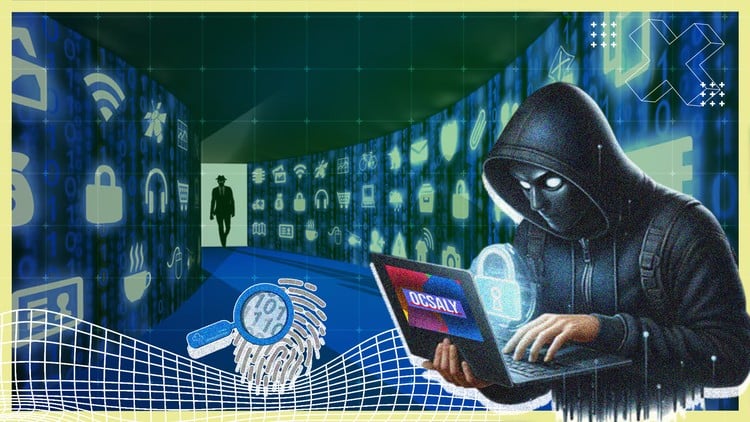
Learn digital forensics and be computer forensics investigator / Certificate after completing course / DFMC+ / DFIR 2025
⏱️ Length: 21.1 total hours
⭐ 4.21/5 rating
👥 122,820 students
🔄 May 2025 update
Add-On Information:
Note➛ Make sure your 𝐔𝐝𝐞𝐦𝐲 cart has only this course you're going to enroll it now, Remove all other courses from the 𝐔𝐝𝐞𝐦𝐲 cart before Enrolling!
-
Course Overview
- This masterclass immerses you in the critical domain where cyber threats meet meticulous investigation, equipping you with strategic foresight and tactical precision. It covers the entire digital forensic investigation lifecycle: from incident detection and secure evidence acquisition to in-depth analysis and comprehensive reporting.
- The curriculum emphasizes crucial legal and ethical considerations for handling sensitive digital evidence, ensuring findings are accurate and admissible. This course cultivates a rigorous, analytical mindset, transforming participants into adept digital defenders capable of dissecting intricate cyber incidents with confidence.
- You will grasp foundational principles for effective incident response, learning to swiftly contain breaches, eradicate threats, and recover compromised systems efficiently. The program bridges theoretical knowledge with practical application, preparing you for real-world scenarios by focusing on the methodologies that underpin successful forensic engagements in diverse operational environments.
-
Requirements / Prerequisites
- No advanced prior experience required, though a foundational understanding of computer operating systems (Windows, Linux basics) and general networking concepts is beneficial.
- Access to a personal computer with internet connectivity and sufficient processing power for optional virtualization exercises.
- A genuine interest in cybersecurity, investigative techniques, and problem-solving is paramount.
- Willingness to engage with complex technical concepts and dedicate time to practical exercises is essential for mastery.
-
Skills Covered / Tools Used
- Mastering Secure Evidence Acquisition: Develop expertise in non-invasive data collection techniques, ensuring the integrity and admissibility of digital evidence from various sources, including volatile and non-volatile memory.
- Advanced Data Recovery & Carving: Learn sophisticated methods for recovering deleted, fragmented, or hidden data fragments from damaged or formatted storage, crucial for uncovering elusive evidence.
- Detailed System Artifact Analysis: Gain proficiency in interpreting critical system artifacts such as event logs, registry entries, browser histories, and metadata to reconstruct events and user activity.
- Introduction to Memory Forensics: Explore foundational concepts of analyzing RAM dumps to identify running processes, malware injections, and user activities that vanish upon system shutdown.
- Timeline Reconstruction & Event Correlation: Develop the ability to piece together chronological events from disparate log sources and system artifacts to create a coherent narrative of an incident.
- Detecting Anti-Forensics Techniques: Understand common methods used by adversaries to obscure their tracks and develop strategies to bypass or mitigate them.
- Forensic Reporting & Expert Testimony Preparation: Learn to document findings thoroughly, produce legally sound forensic reports, and articulate technical information clearly for non-technical audiences.
- Strategic Use of Forensic Frameworks: Understand the application of various open-source and commercial forensic analysis frameworks to streamline investigations and enhance efficiency.
-
Benefits / Outcomes
- Accelerated Career Advancement: Position yourself as a highly sought-after professional in the rapidly expanding fields of digital forensics, cybersecurity, and incident response.
- Certification & Credibility: Earn a recognized certificate (DFMC+ / DFIR 2025) that validates your specialized knowledge and practical skills to potential employers and clients.
- Enhanced Problem-Solving Acumen: Develop a meticulous, analytical approach to complex technical challenges, applicable far beyond forensic investigations.
- Practical Readiness: Graduate with the confidence and hands-on capability to conduct independent forensic examinations and contribute effectively to incident response teams.
- Contribution to Cyber Resilience: Play a vital role in protecting individuals and organizations against cyber threats by identifying, analyzing, and mitigating digital attacks.
- Understanding of Legal & Ethical Compliance: Operate within the bounds of legal frameworks and ethical guidelines, ensuring all investigative actions are compliant.
- Foundation for Advanced Specializations: Build a robust knowledge base that serves as a springboard for further specialization in areas like network forensics, mobile forensics, or malware analysis.
-
PROS
- Highly Relevant & In-Demand Skills: Addresses critical needs in today’s cybersecurity landscape, offering practical expertise that is immediately applicable.
- Comprehensive Curriculum: Covers a broad spectrum of digital forensics topics, ensuring a holistic understanding of the field.
- Accessible Learning: Designed for a wide audience, enabling effective learning for individuals with varying levels of prior technical experience.
- Instructor Expertise: Benefits from a curriculum developed by seasoned professionals, ensuring up-to-date and accurate content.
- Strong Social Proof: High student enrollment and positive ratings indicate a well-received and valuable learning experience.
- Certification for Professional Recognition: Provides a tangible credential to validate acquired skills and enhance career prospects.
-
CONS
- Rapid Technological Evolution: The field of digital forensics is constantly changing, requiring continuous self-study beyond the course to stay current with new tools, techniques, and threat vectors.
Learning Tracks: English,IT & Software,Network & Security
Found It Free? Share It Fast!